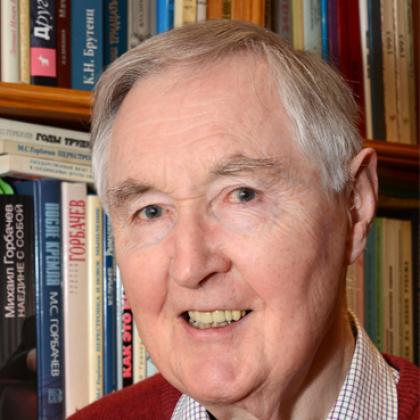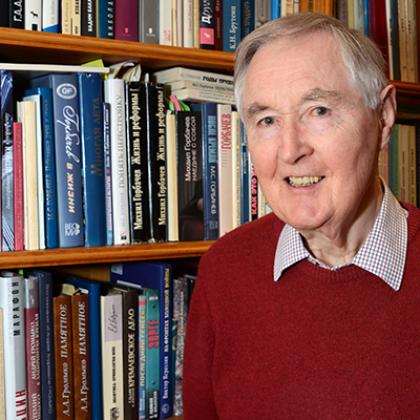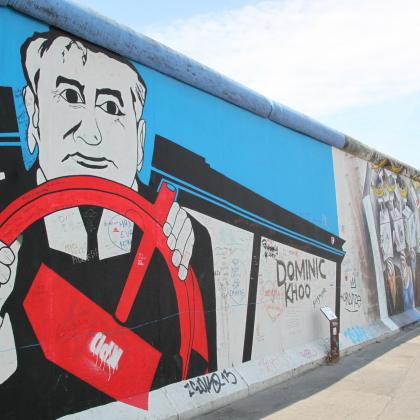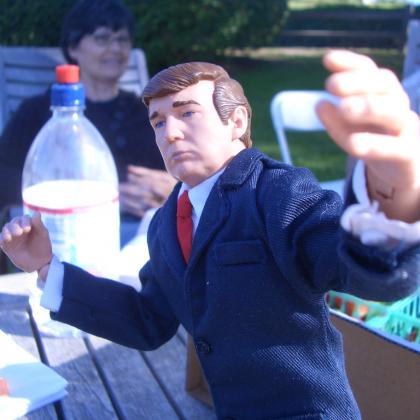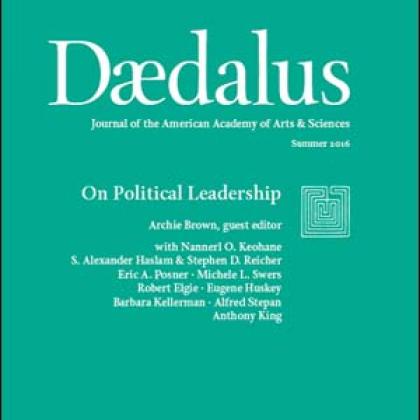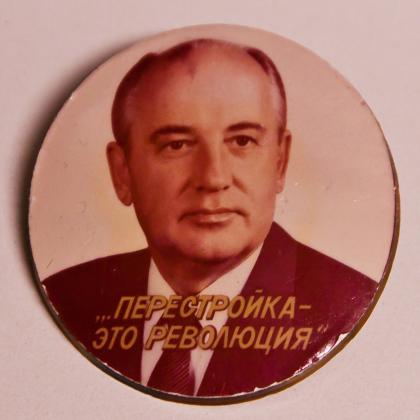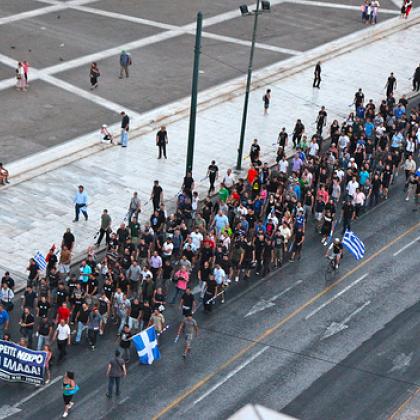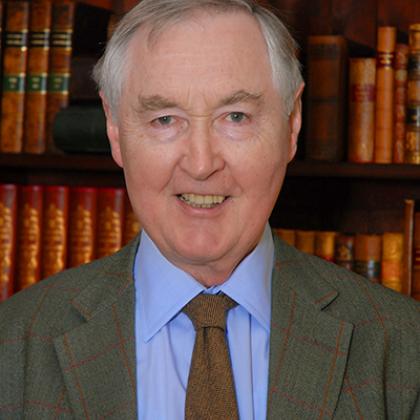Archie Brown
CMG FBA
After teaching for thirty-four years at St Antony’s College, Archie Brown became Emeritus Professor of Politics at Oxford University and an Emeritus Fellow of St Antony’s from 1 October 2005. He continues to undertake an active programme of research and writing.
Professor Brown was University Lecturer in Soviet Institutions from 1971 until 1989, and from 1989 to 2005 Professor of Politics. He was Sub-Warden of St Antony’s College, 1995-97, and Director of the Russian and East European Centre (as it was then called), 1991-94 and 1998-2001. He was Director of Graduate Studies in Politics for the University from 2001 until 2003.
After studying at the London School of Economics and Political Science as an undergraduate and graduate student, Archie Brown taught at Glasgow University from 1964 to 1971. During the 1967-68 academic year he was a British Council exchange scholar at Moscow State University. He has been Visiting Professor of Political Science at Yale; the University of Connecticut; Columbia University; and the University of Texas at Austin as the holder of the Frank C. Erwin, Jr. Centennial Chair of Government. In the Fall semester of 1998 he was Distinguished Visiting Fellow of the Helen Kellogg Institute for International Studies, University of Notre Dame.
Archie Brown’s most recent book, The Human Factor: Gorbachev, Reagan, and Thatcher, and the End of the Cold War, was published by Oxford University Press (Oxford and New York) in Spring 2020. This book was awarded the Pushkin House Book Prize 2021 for ‘original, insightful and well-written books’ relating to Russia, published in English in any country in the world. The panel of judges was chaired by Fiona Hill who has served in three different American presidential administrations and was Senior Director for European and Russian Affairs in the US National Security Council, 2017-2019. His immediately preceding book, The Myth of the Strong Leader: Political Leadership in the Modern Age (Bodley Head, London, and Basic Books, New York, 2014) was chosen as a Book of the Year by Bill Gates (news/bill-gates-recommends-archie-browns-myth-of-the-strong-leader.html). It was republished, with updating new Foreword as a Vintage paperback in 2018. Two of his earlier books, The Rise and Fall of Communism (Bodley Head, London, and Ecco, New York, 2009) and The Gorbachev Factor (Oxford University Press, 1996) were awarded both the W.J.M. Mackenzie Prize of the Political Studies Association for best politics book of the year and the Alec Nove Prize of the British Association for Slavonic and East European Studies for best book on Russia, Communism or Post-Communism.
Professor Brown was elected a Fellow of the British Academy in 1991 and was Chair of the Academy’s Political Studies Section, 1999-2002. He was chosen as a founding academician of the Academy of Social Sciences in 1999, and in 2003 he was elected a Foreign Honorary Member of the American Academy of Arts and Sciences. In 2005 he was awarded a CMG in the Queen’s Birthday Honours list ‘for services to UK-Russian relations and to the study of political science and international affairs’. In November 2010 Archie Brown was one of three recipients of the Diamond Jubilee Lifetime Achievement in Political Studies awards made by the Political Studies Association to celebrate the sixtieth anniversary of the founding of the PSA.
He also received the 2015 Distinguished Contributions to Slavic, East European and Eurasian Studies Award in Philadelphia in November 2015 from the largest body of scholars studying that part of the world, the US-based Association for Slavic, East European and Eurasian Studies.
In 2022 Professor Brown was awarded a Leverhulme Emeritus Fellowship for the academic year 2022-23 for a study of ‘Changing perceptions of the roles and powers of the British Prime Minister’.
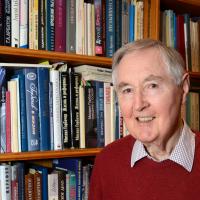
Research summary
Archie Brown’s principal research interests are the comparative study of political leadership, the end of the Cold War, the Gorbachev era, the evolution and dissolution of Communism, political culture, authoritarianism and democratization, and national identity.
Research interests
Political Theory, Government, Authority, Democratic theory, Democracy and Democratisation, Foreign Policy and diplomacy, History, Ideology, Public Policy, Public Sphere
Publications
Recent publications (since 2005)
Books
The Human Factor: Gorbachev, Reagan, and Thatcher, and the End of the Cold War, Oxford and New York, Oxford University Press (2020: paperback 2022): Winner of the Pushkin House Book Prize 2021.
The Myth of the Strong Leader: Political Leadership in the Modern Age, Bodley Head, London, and Basic Books, New York, (Vintage paperback, with updating new Foreword, 2018). Translations into Arabic, 2015; Korean, 2017; German, 2018; Spanish, 2018; Japanese, 2018, Russian, 2019; Chinese (Taiwan), 2019; and Czech, 2021
The Rise and Fall of Communism, London, Bodley Head; New York, Ecco; and Toronto, Doubleday, 2009 (translations published in Germany and the Netherlands, 2009; Portugal, 2010; the Czech Republic, Estonia, and Brazil, 2011; Israel and Japan, 2012; and Russia, 2014)
Seven Years that Changed the World: Perestroika in Perspective, Oxford and New York, Oxford University Press, 2007 (Chinese translation, Beijing, 2012)
Articles and chapters
(with Nicholas James), ‘The Self-Magnification of British Leaders: Prime Ministers’ Perceptions of their Powers and Roles in the Postwar Era’, The Political Quarterly, Vol. 96, No. 2, 2025, published online 26 February 2025 (open access): https://doi.org/10.1111/1467-923X.13510
“The Scottish Enlightenment and the Father of Russian Jurisprudence: The Impact of Adam Smith, John Millar and Glasgow University on Semyon Efimovich Desnitskii (c. 1740 – 1789), Canadian-American Slavic Studies, Vol. 58, Nos. 1-2, 2024, pp. 11-66; published online 7 December 2023 (open access article) https://doi.org/10.30965/22102396-05801005
“Evaluating the Demise of the Soviet Union”, Journal of Cold War Studies, Vol. 25, No. 3, 2023, pp. 143-153
“Context, Cross-Pressures and Compromise: The Roles of Gorbachev and Yeltsin”, in Charles Clarke, ed., Understanding the Baltic States: Estonia, Latvia and Lithuania since 1991 (Hurst, London, 2023), pp. 123-136
“Mikhail Gorbachev and the Politics of Perestroika”, Russian History, Vol. 40, 2022, pp. 123-145; https://doi.org/10.30965/18763316-1234044
‘The End of Communist Rule in Europe: A Comparative Perspective on the Fragility and Robustness of Regimes’ in Richard Ned Lebow and Ludvig Norman (eds), The Robustness and Fragility of Political Orders (Cambridge University Press, New York, 2022), pp. 141-175
‘Five Misinterpretations of the Ending of the Cold War’, Jeju Forum Journal, online September 2021, http://jpi.or.kr/?p=19643; hard copy, Vol. 1, December 2021, pp. 4-15
‘Leadership Singular and Plural’(review essay), Society, Vol. 58, No.4, 2021, https://doi.org/10.1007/s12115-021-00613-8
‘Mikhail Gorbachev: A Transformational Leader’, Demokratizatsiya: The Journal of Post-Soviet Democratization, Vol. 29, No. 3, 2021, pp. 239-248
‘Togda i seychas’ (Then and Now), Rossiya v global’noy politike, Vol. 19, No. 3, May-June 2021, pp. 174-179; https://globalaffairs.ru/articles/togda-i-sejchas/
‘Leadership and Crisis: The last years of the Soviet Union, 1985-91’, APSA-CP Newsletter, Vol. XXX, No. 2, Fall 2020, pp. 73-80
‘Political leadership in the Cold War’s ending: Thatcher and the turn to engagement with the Soviet Union’, LSE British Politics and Policy blog, 10 June 2020 (https://blogs.lse.ac.uk/politicsandpolicy/thatcher-end-of-cold-war/)
‘All power to 10 Downing Street: Johnson’s first major reshuffle and the perils of presidentialism’, LSE British Politics and Policy Blog, 17 February 2020 (https: blogs.lse.ac.uk/politicsandpolicy/the-perils-of-presidentialism/)
‘The Top Leader Fixation in British Politics’ in Ivor Crewe and David Sanders (eds), Authoritarian Populism and Liberal Democracy: Essays in Memory of Anthony King (Macmillan, London, 2020), pp. 227-239; https://doi.org/10.1007/978-3030-17997-7_15
‘Alfred Stepan’ in Biographical Memoirs of Fellows of the British Academy XVIII (Oxford University Press, 2019), pp. 411-447
‘Chernyaev, perestroika i transformatsiya sovetskoy vneshney politiki’ (Chernyaev, Perestroika and the Transformation of Soviet Foreign Policy’ in Dmitriy Belanovsky (ed.), “My nazyvali ego Grafom”: Pamyati Anatoliya Sergeevicha Chernyaeva (Lyubimaya Rossiya, Moscow, 2019), pp. 139-144
‘Adam Smith’s Psychological and Political Insight: The Theory of Moral Sentiments’ in Social Research, Vol. 85, No. 3, Fall 2018, pp. 541-555
‘Gorbachev, Perestroika, and the End of the Cold War’ in Bradley Lynn Coleman and Kyle Longley (eds), Reagan and the World: Leadership and National Security, 1981-1989 (University of Kentucky Press, Lexington, 2017), pp. 111-126
‘Against the Führerprinzip: For Collective Leadership’ in Daedalus, Vol. 145, No. 3, Summer 2016, pp. 109-123; [also Guest Editor of that special issue of Daedalus on political leadership, and author of Introduction, pp. 5-7]
‘Politicheskoe liderstvo i politicheskaya vlast’’ in Polis: Politicheskie issledovaniya (Moscow), No. 1, 2016, pp. 104-120
‘The End of the Soviet Union’, review article in Journal of Cold War Studies, Vol. 17, No. 4, Fall 2015, pp. 158-165
‘The Scottish Question in British Politics’ in Wm Roger Louis (ed.), Resplendent Adventures with Britannia: Personalities, Politics and Culture in Britain (Tauris, London, 2015), pp. 355-367
‘Mikhail Gorbachev’ in Steven Casey and Jonathan Wright (eds), Mental Maps in the Era of Détente and the End of the Cold War (Palgrave Macmillan, London, 2015), pp. 216-235.
‘Questioning the mythology of the strong leader’, Leadership, DOI: 10.1177/174271501559066 (online) and Vol. 11, No. 3, August 2015 (hard copy)
‘Mikhail Gorbachev’ in Joel Krieger (ed.), The Oxford Companion to International Relations (Oxford University Press, New York, 2014), Vol. 1, pp. 378-381
‘Alfred Stepan and the Study of Comparative Politics’ (review article), Government and Opposition, Vol. 49, No. 2, April 2014, pp. 313-330
‘The Study of Communist and Post-Communist Politics’ (with Stephen Whitefield) in Christopher Hood, Desmond King and Gillian Peele (eds), Forging a Discipline: A Critical Assessment of Oxford’s Development of the Study of Politics and International Relations in Comparative Perspective (Oxford University Press, Oxford, 2014), pp. 246-263
‘Communism’ in Michael Freeden, Lyman Tower Sargent and Marc Stears (eds), The Oxford Handbook of Political Ideologies (Oxford University Press, Oxford, 2013), pp. 364-384
‘Did Gorbachev as General Secretary Become a Social Democrat?’, Europe-Asia Studies, Vol. 65, No. 2, March 2013, pp. 198-220
‘Margaret Thatcher and the End of the Cold War’ in Wm Roger Louis (ed.), Resurgent Adventures with Britannia: Personalities, Politics and Culture in Britain (Tauris, London, 2011, p. 259-273 (expanded version published in Russian in Polis (Moscow), No. 1 (127), 2012, pp. 76-91
‘The Gorbachev Factor Revisited’ in Problems of Post-Communism, Vol. 58, Nos. 4-5, 2011, pp. 56-65
‘Why did Communism end in Europe and mutate in Asia?’, The Journal of International Relations (Taiwan), No. 30, July 2010, pp. 1-13
‘Dvadtsat’ let spustya: chto dalo vozhmozhnost’ polozhit’ konets kommunizma v Sovetskom Soyuze?’, Vestnik Analitiki (Moscow), No. 3 (41), 2010, pp. 5-11
‘The Fatal Contradictions of Marxism: A Rejoinder’, Quarterly Review, Vol. 4, No. 2, July 2010, pp.51-54
‘Gorbachev and Perestroika: A Twenty-Fifth Anniversary Perspective’, Baltic Worlds, Vol. III, No. 3, September 2010, pp. 22-26
“Margaret Thatcher and Perceptions of Change in the Soviet Union”, Journal of European Integration History, Vol. 16, No. 1, 2010, pp. 17-31
“Perestroika as Revolution from Above” in Stephen Fortescue (ed.), Russian Politics from Lenin to Putin (Palgrave Macmillan, St Antony’s series, Basingstoke, 2010), pp. 127-151
“The Gorbachev revolution and the end of the Cold War” in Odd Arne Westad and Melvyn P. Leffler (eds), The Cambridge History of the Cold War, Volume 3, Endings, 1975-1991 (CUP, Cambridge and New York, 2010), pp. 244-266
“Reading Russia: Forms without Substance”, Journal of Democracy, Vol. 20, no. 2, April 2009, pp. 47-51
“The Change to Engagement in Britain’s Cold War Policy: The Origins of the Thatcher-Gorbachev Relationship”, Journal of Cold War Studies, Vol. 10, No. 3, Summer 2008, pp. 3-47
“Gorbachev, Lenin i razryv s Leninizmom”, Polis, No. 6, 2007 (translation of Demokratizatsiya article into Russian), pp. 71-85
“Gorbachev, Lenin, and the Break with Leninism”, Demokratizatsiya, Vol. 15, No. 2, Spring 2007, pp. 230-244
“Perestroika and the End of the Cold War”, Cold War History, Vol. 7, No. 1, February 2007, pp. 1-17
“The End of the Cold War” in O.M. Zdravomyslova (ed.), Gorbachevskie chteniya (Gorbachev Foundation, Moscow, 2006), pp. 248-252
Entries on Mikhail Gorbachev, Eduard Shevardnadze, Mikhail Suslov, Alexander Yakovlev, ‘Real Socialism’, ‘New Political Thinking’, Perestroika, and the August 1991 Coup for Silvio Pons and Robert Service (eds), Dictionary of Communism (Giulio Einaudi Editore, Turin, 2006)
“Cultural Change and Continuity in the Transition from Communism: The Russian Case”, pp. 387-405 in Lawrence E. Harrison and Peter Berger (eds), Developing Cultures: Case Studies (Routledge, New York, 2006)
Conclusions on “Exit from totalitarianism – which way out?” in Andrei Grachev, Chiara Blengino and Rossella Stievano (eds), 1985-2005: Twenty Years that Changed the World (World Political Forum and Editoria Laterza, Rome, 2005), pp. 33-34 and 69-73
‘The Gorbachev Era” in Ronald G. Suny (editor), The Cambridge History of Russia, vol. 3 (CUP, New York, 2006), pp. 316-351
“Conclusions” for Stephen Whitefield (ed.), Political Culture and Post-Communism (Palgrave Macmillan, St Antony’s series, Basingstoke, 2005), pp. 180-202
“Perestroyka i pyat’ transformatsiy” in V.B. Kuvaldin (ed.), Proryv k svobode: o perestroyke dvatsat’ let spustya – kriticheskiy analiz (Al’pina Biznes Books, Moscow, 2005), pp. 46-65
“Comparative Politics: A View from Britain”, APSA-CP Newsletter, Vol. 16, No. 1, 2005, pp. 1-5
Related News
Back
More



